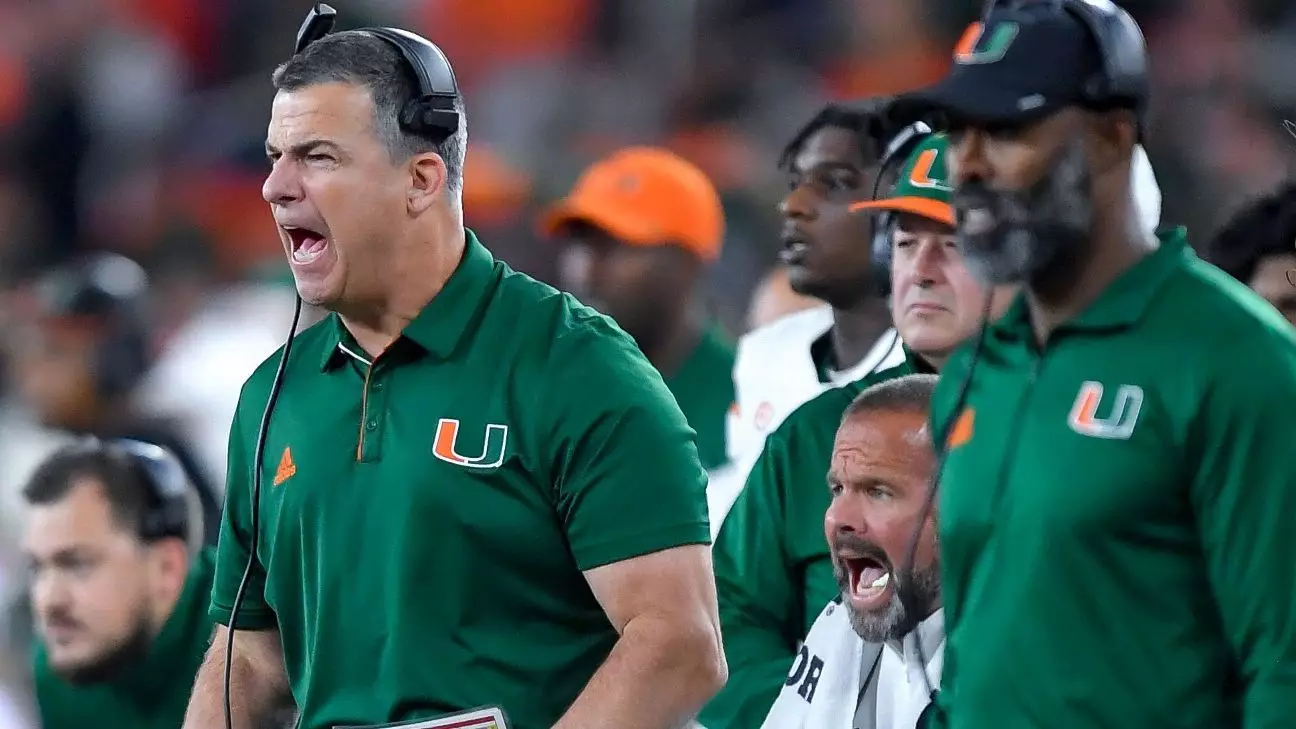The recent release of the College Football Playoff (CFP) rankings has ignited a firestorm of debate, particularly surrounding the Miami Hurricanes’ absence from the top tier of contenders. Step into the shoes of Miami fans, players, and coaches — the feeling of frustration is palpable. Despite a commendable 10-2 record for the season, the Hurricanes found themselves sitting at No. 12 in the rankings, just below Alabama, which claimed the No. 11 spot. This outcome was especially disheartening for Miami, given that they had initially started their season on a high note, amassing an impressive 9-0 record.
In the wake of the rankings release, the Atlantic Coast Conference (ACC) voiced its strong discontent. The ACC commissioner, Jim Phillips, expressed that the ranking committee’s decision was “incredibly shocking and disappointing.” Miami’s slide from a higher position raised eyebrows around the league, prompting suggestions that the Hurricanes “absolutely deserve better.” There’s a sense that Miami’s exclusion from the playoff picture reflects a broader issue within playoff selection protocols and biases against certain conferences, especially when comparing teams with similar records but contrasting performances against ranked opposition.
In a proactive move, Miami head coach Mario Cristobal took to the airwaves, urging the selection committee to weigh the tangible facts of his team’s performance. Cristobal underscored that Miami secured ten victories while also pointing out the narrow margin by which they lost their two games. Such a perspective is pivotal; it highlights Miami’s competitiveness despite the setbacks. He argued that a one-possession loss showcases a different narrative compared to teams that finish with more conventional records yet might lack the same depth of competition experience.
Season Analysis: Strengths and Weaknesses
Examining the Miami Hurricanes’ season unveils both strengths and vulnerabilities. Offensively, the team demonstrated their capabilities, leading the nation in both yards and points per game. Their quarterback, Heisman Trophy contender Cam Ward, made a significant mark, throwing for an astounding 36 touchdown passes. At home, they maintained a clean slate, reflecting their strategic prowess when playing in familiar territory.
However, the team grappled with defensive inconsistency. Allowing over 30 points in several games revealed a susceptibility that may have raised red flags for the committee. Their losses to Georgia Tech and Syracuse by a combined nine points raise questions, yet they also illustrate that the Hurricanes were in a position to win those games. Thus, the narrative complicates; Miami’s strong starts were marred by unfortunate finishes, leaving them on the outside looking in when it comes to playoff selection.
The Argument for Fair Play
Cristobal’s passionate plea for recognition of Miami reflects a deeper concern for fair play in college football. He asserted that teams’ success should be based on performance on the field rather than politicking for recognition or relying on reputations built in years past. Supporting this is the fact that while Miami faced difficulties, they still excelled in offensive rankings, suggesting that they should be considered for their competitive merits rather than simple metrics of ranking failures.
As the ACC continues to ponder the future of its teams in college football playoff considerations, there is value in the Miami Hurricanes’ narrative. They challenge institutions to rethink how they measure success and the complexity of competitive sports environments. In a landscape rife with strong teams and competitive play, the fate of Miami serves as a stark reminder of the biases and challenges faced by teams outside the conventional powerhouses of college football.
With the final scrutiny over the CFP rankings taking shape, Miami’s future within the college football playoff landscape remains uncertain. As the Hurricanes reflect on the season, their ability to rebound and strategize for the upcoming matches can potentially redefine their standing in subsequent seasons. Advocacy for fair recognition and the importance of performance will continue to resonate, not only for Miami but for teams across the nation facing similar struggles. The case of the Hurricanes exemplifies not just a single team’s journey but sheds light on the ongoing discourse surrounding equity in college football.



Leave a Reply